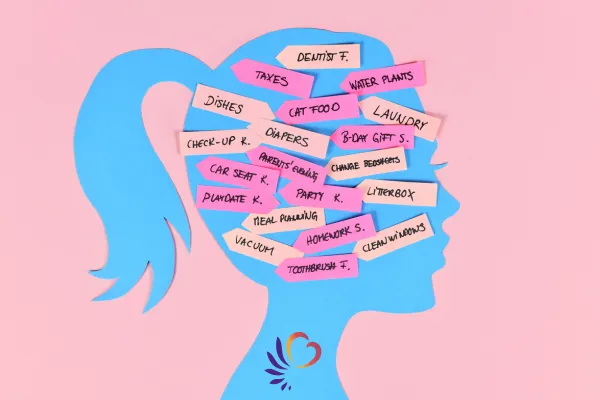
Why You Feel Like You're Drowning in Motherhood (And Why It's Not Your Fault): Understanding the Hidden Weight of Mental Load

Why You Feel Like You're Drowning in Motherhood (And Why It's Not Your Fault): Understanding the Hidden Weight of Mental Load
You're not broken. You're not failing. You're carrying an invisible burden that most people don't even know exists.
It's 11 PM, and you're finally crawling into bed after what feels like the longest day of your life. But instead of sleep, your mind starts racing through tomorrow's endless to-do list: pack lunches, remember the field trip permission slip, call the pediatrician about your youngest's cough, pick up groceries, figure out what's for dinner, don't forget the parent-teacher conference next week...
Sound familiar?
If you're nodding your head right now, you're not alone. Millions of mothers around the world are lying awake at night, overwhelmed by the constant mental juggling act that comes with motherhood. What you're experiencing has a name: mental load—and it's affecting your wellbeing in ways you might not even realize.
What Exactly Is Mental Load (And Why It's Exhausting You)
Mental load refers to the invisible, cognitive work of managing a household and family. It's not just the physical tasks you do throughout the day—it's the constant thinking, planning, remembering, and organizing that happens in your mind 24/7.
Think of it this way: while your partner might help with dishes or bedtime routines, you're the one remembering that your daughter needs new school shoes, keeping track of everyone's schedules, and mentally preparing for the grocery run while simultaneously listening to your child's story about their day.
Dr. Allison Daminger, a Harvard sociologist who studies household labor, breaks mental load down into four key components:
Anticipating needs (realizing the kids need winter coats before it gets cold)
Identifying options (researching which coats are best and where to buy them)
Deciding among alternatives (choosing which coats to purchase)
Monitoring follow-through (making sure the coats fit and are actually worn)
Notice how exhausting that sounds? And that's just for winter coats. Now multiply that by every single aspect of your family's life.
The Science Behind Why Mental Load Feels So Heavy
Research shows that this constant cognitive burden isn't just "in your head"—it has real, measurable effects on your brain and body. A 2024 study by Weeks and Ruppanner published in the Journal of Marriage and Family highlights how this disproportionate burden on mothers significantly contributes to their overall stress levels and lower well-being. Additionally, research published in the Journal of Health and Social Behavior indicates that chronic stressors, particularly those related to family responsibilities, are significantly linked to higher levels of emotional distress and physical health problems in women.
Neuroscience research reveals that when our brains are constantly switching between tasks and holding multiple pieces of information (exactly what mental load requires), it creates what scientists call "cognitive overload." This overload triggers our body's stress response system, flooding us with cortisol—the same hormone released when we're in physical danger.
Your body literally can't tell the difference between running from a bear and trying to remember whether you scheduled that dentist appointment while simultaneously worrying about your teenager's grades and planning next week's meals.
As Dr. Eve Rodsky, author of "Fair Play," explains, when women are holding all of this invisible work, their brains are like browsers with 47 tabs open. And just like your computer slows down with too many tabs, so does your ability to be present and patient.
This isn't just "in your head." Chronic stress and burnout have tangible, measurable effects on your physiology. When you’re constantly operating in a state of high alert – even if it’s just mental “alert” – your body’s stress response system (the sympathetic nervous system) is activated.
Cortisol Overload: Your adrenal glands continuously pump out cortisol, the primary stress hormone. While helpful in short bursts, chronic high cortisol can lead to:
Fatigue: Paradoxically, constantly being "on" exhausts your energy reserves.
Sleep Disturbances: Even when you’re exhausted, your wired nervous system can make it hard to fall or stay asleep.
Impaired Immune Function: You might find yourself getting sick more often.
Increased Inflammation: Chronic stress can lead to systemic inflammation, contributing to various health issues.
Brain Fog: Difficulty concentrating, remembering things, and making decisions. This is often linked to the hippocampus, the brain area crucial for memory, being impacted by chronic stress.
Nervous System Dysregulation: Your body gets "stuck" in fight-or-flight mode. It struggles to shift back into the "rest and digest" (parasympathetic) state, leading to persistent tension, anxiety, and a feeling of being constantly on edge.
Prefrontal Cortex Impact: The part of your brain responsible for executive functions – planning, problem-solving, impulse control, and emotional regulation – takes a hit. This explains why making even simple decisions can feel overwhelming when you’re burned out, and why regulating your own emotions feels like an uphill battle.
Why Society Makes Mental Load "Your Job"
Here's something that might make you feel both validated and frustrated: the reason you're carrying most of this mental load isn't because you're naturally better at it or because you "signed up for it." It's because of deeply ingrained social expectations that have been passed down for generations.
A 2020 article from the Bureau of Labor Statistics on dual-income households with children provides data that aligns with broader research, including that from the Pew Research Center, showing that mothers often carry a disproportionate amount of household management, even when both parents work full-time. It's not just about time spent, but about the mental responsibility.
Even when partners help with physical tasks, the mental load—the remembering, planning, and worrying—still falls primarily on mothers. You're the family's "default parent," the one everyone turns to when they can't find something, need a decision made, or have a problem to solve.
This isn't happening because you're a control freak or because your partner is lazy. It's happening because society has conditioned us to believe that mothers are naturally responsible for the emotional and logistical wellbeing of the family. From the moment we become mothers, we're expected to develop a supernatural ability to keep track of everything while making it look effortless.
The Hidden Costs of Carrying It All
The impact of mental load extends far beyond feeling tired or stressed. The American Psychological Association (APA) and other research bodies highlight how chronic mental load can lead to:
Physical Symptoms:
Chronic fatigue that sleep doesn't fix
Frequent headaches and muscle tension
Digestive issues and changes in appetite
Weakened immune system
Sleep disturbances (even when you're exhausted)
Emotional Impact:
Increased irritability and impatience
Feelings of resentment toward family members
Loss of identity beyond being a mother
Anxiety about forgetting important things
Depression and feelings of overwhelm
Relationship Strain:
Decreased intimacy with your partner
Difficulty being present with your children
Social isolation as you feel too overwhelmed to maintain friendships
Communication breakdown as you struggle to articulate why you're so stressed
Perhaps most heartbreaking of all, heavy mental load can impact your ability to model healthy emotional regulation for your children. When you're constantly overwhelmed, your nervous system stays in a state of hypervigilance, making it harder to respond to your children's needs with patience and presence.
The Ripple Effect on Your Children
Speaking of your children, here's something that might surprise you: research shows that when mothers carry excessive mental load, it doesn't just affect them—it affects the entire family system.
A 2021 longitudinal study by Schmiedeler, Riem, and Zemp in Developmental Psychology found that mothers experiencing chronic overwhelm were more likely to have children who struggled with emotional regulation themselves. This isn't about blame or shame—it's about understanding that our nervous systems are contagious, especially to the little people who look to us for emotional cues about how safe the world is.
When you're constantly in survival mode, managing countless details and feeling overwhelmed, your children unconsciously absorb that energy. They may become more anxious, have difficulty self-soothing, or develop their own tendencies toward perfectionism and over-responsibility.
The good news? Understanding this connection is the first step toward breaking the cycle and teaching your children healthier patterns of emotional regulation—but it starts with addressing your own overwhelm first.
Why Traditional "Self-Care" Advice Falls Short
If you've been told that a bubble bath or girls' night out will solve your overwhelm, you've probably discovered that these temporary fixes don't address the root of the problem. That's because mental load isn't a surface-level issue that can be solved with external remedies.
Mental load is a systemic issue that requires systemic solutions. It's not about finding more time in your day or becoming more organized (though those things can help). It's about understanding how your nervous system responds to chronic cognitive demands and learning to create sustainable changes in how you think about and manage your responsibilities.
Dr. Pooja Lakshmin, a women's mental health specialist and author of "Real Self-Care," emphasizes that real wellness for mothers isn't about adding more things to your plate. It's about fundamentally shifting how you relate to the demands on your time and energy.
This means moving beyond quick fixes and developing a deeper understanding of:
How your brain and body respond to chronic stress
Why you feel compelled to manage everything yourself
What emotional patterns keep you stuck in overwhelm
How to create sustainable boundaries without guilt
Ways to shift from surviving to actually thriving in motherhood
The Questions You're Probably Asking Right Now
"Is it normal to feel angry about carrying so much mental load?" Absolutely. Anger is often a sign that your boundaries are being crossed or your needs aren't being met. It's your inner wisdom telling you that something needs to change.
"Will I ever feel like myself again, or is this just motherhood?" Overwhelm is common in motherhood, but it's not inevitable. Many mothers find ways to maintain their sense of self while fulfilling their family responsibilities—it just requires intentional strategies and support.
"How do I know if my stress level is normal or if I need help?" If your overwhelm is interfering with your sleep, relationships, physical health, or ability to enjoy moments with your family, it's worth addressing. You don't have to wait until you're in crisis to seek support.
"Is it selfish to want to reduce my mental load when my family depends on me?" Taking care of your mental and emotional wellbeing isn't selfish—it's essential. You can't pour from an empty cup, and modeling healthy boundaries teaches your children valuable life skills.
"I feel guilty about wanting 'me time.' Is that normal?" Absolutely normal, and incredibly common! Mom guilt is a pervasive and often unhelpful emotion. It stems from societal expectations and internal pressure to be constantly available. However, neglecting your own needs is a fast track to burnout. Self-care isn't selfish; it's essential for your well-being and, ultimately, for your ability to be present and patient with your family.
"I want to teach my kids emotional regulation, but I can barely regulate my own emotions. How can I even start?" This is the perfect question, and it highlights a fundamental truth: you can only effectively teach what you embody. The most powerful way to teach your children emotional regulation is to model it yourself. This doesn't mean being perfect; it means demonstrating self-awareness, acknowledging your own emotions (even difficult ones), and showing them healthy coping strategies. Our approach focuses precisely on this – empowering you to regulate your own emotions first, so you can naturally and authentically guide your children. It’s not about giving them a script; it’s about giving them a living example.
What This Means for Your Family's Future
Understanding mental load and its impact isn't just about making your current life more manageable (though that's important too). It's about breaking generational patterns and creating a different legacy for your children.
When you learn to recognize and address overwhelm, you're teaching your children:
That it's okay to have limits and set boundaries
How to identify and communicate their emotional needs
That asking for help is a sign of strength, not weakness
How to create sustainable rhythms instead of constant chaos
The Center for Parent Information and Resources (CPIR) provides guidance that emphasizes that when parents are able to manage their own emotions and stress, it positively impacts their children's development of emotional intelligence, leading to better relationships, academic performance, and overall mental health throughout their lives.
The Path Forward Starts with Understanding
If you're reading this and feeling seen—if you're recognizing yourself in these descriptions of mental load and overwhelm—know that awareness is the first step toward change. You're not broken, and you're not failing. You're a mother trying to do an impossible job without the right tools or support.
The invisible weight you've been carrying has a name, and it has solutions. While the journey toward sustainable wellbeing isn't always linear, it starts with understanding that your overwhelm makes perfect sense given what you're dealing with.
You deserve to feel calm and present in your own life. You deserve to have energy for the things that matter most to you. And yes, you deserve to model emotional regulation for your children—not from a place of perfection, but from a place of authentic, sustainable wellness.
Your overwhelm is real, it's valid, and it's not a character flaw. It's a signal that something in your life needs attention, care, and intentional change. And the beautiful thing about being aware of mental load is that once you understand it, you can begin to transform your relationship with it.
Because here's what I want you to know: there is a way to be a present, loving mother without drowning in the process. There is a way to care for your family while also caring for yourself. And there is absolutely a way to break free from the cycle of overwhelm that has become so normalized in motherhood.
The journey toward sustainable wellbeing starts with recognizing that you're not alone in this struggle—and that the weight you've been carrying doesn't have to define your experience of motherhood.
Your overwhelm is not your fault. But your healing can be your choice.
Are you ready to explore what life could look like when you're no longer drowning in mental load? In our next article, we'll dive into the specific strategies and mindset shifts that can help you move from overwhelm to sustainable wellbeing—without adding more to your already full plate.
From Awareness to Action: How CourTools Can Help You Create Sustainable Change
If you’re ready to take the next step and start lightening your mental load in a way that’s actually doable, CourTools is here to help. Our app was designed specifically for overwhelmed moms like you—offering science-backed, somatic tools and short emotional resets that fit into even the busiest schedule. Whether you have 2 minutes or 10, CourTools helps you regulate your nervous system, shift out of survival mode, and start building routines that actually stick. It’s not about perfection—it’s about learning to center yourself in the chaos and create habits that support your wellbeing in real life.
Start with our free 7-minute masterclass, and see how small changes can lead to real peace.

Resources
Daminger, A. (2019). The Cognitive Dimension of Household Labor. American Sociological Review, 84(4), 609–635.
Also see Dr. Allison Daminger's Research Page: https://www.allisondaminger.com/research
Rodsky, E. (2019). Fair Play: A Game-Changing Solution for When You Have Too Much to Do (and More Life to Live). G.P. Putnam's Sons.
Also see Dr. Eve Rodsky's Website: https://www.everodsky.com/
Weeks, A. C., & Ruppanner, L. (2024). A typology of US parents' mental loads: Core and episodic cognitive labor. Journal of Marriage and Family. https://doi.org/10.1111/jomf.13057
Bureau of Labor Statistics. (2020). Comparing characteristics and selected expenditures of dual- and single-income households with children. U.S. Department of Labor. https://www.bls.gov/opub/mlr/2020/article/comparing-characteristics-and-selected-expenditures-of-dual-and-single-income-households-with-children.htm
Schmiedeler, S., Riem, M. M., & Zemp, M. (2021). Linking transition to motherhood to parenting, children's emotion regulation, and life satisfaction: A longitudinal study. Developmental Psychology, 57(7), 1007–1018. https://pubmed.ncbi.nlm.nih.gov/34060894/
Lakshmin, P. (2023). Real Self-Care: Crystals, Cleanses, and Bubble-Baths Not Included. Penguin Life.
Also see Dr. Pooja Lakshmin's Official Website: https://www.poojalakshmin.com/
Center for Parent Information and Resources (CPIR). (n.d.). Homepage. https://www.parentcenterhub.org/
American Psychological Association. (n.d.). Stress. https://www.apa.org/topics/stress
Pennebaker, J. W. (1997). Writing about emotional experiences as a therapeutic process. Psychological Science, 8(3), 162–166.
Also related research on expressive writing: Frattaroli, J. (2006). Experimental disclosure and its moderators: A meta-analysis. Psychological Bulletin, 132(6), 823–865.






